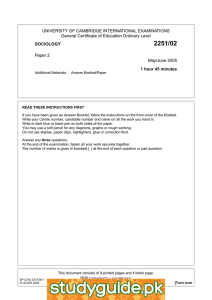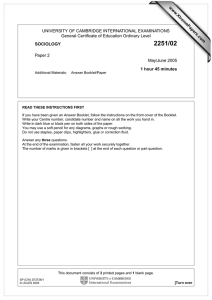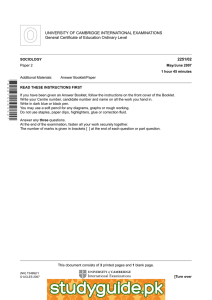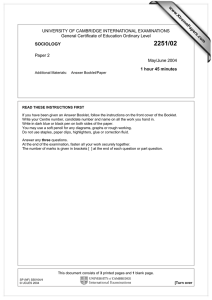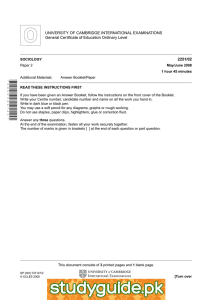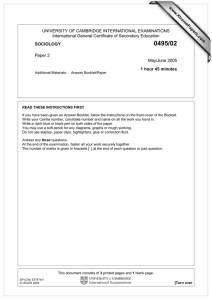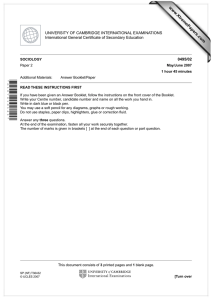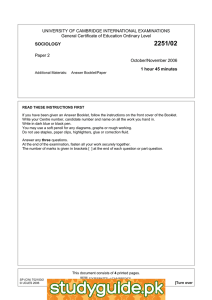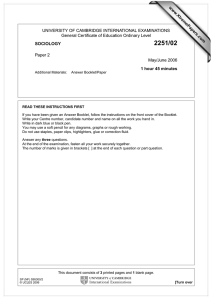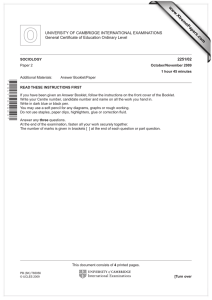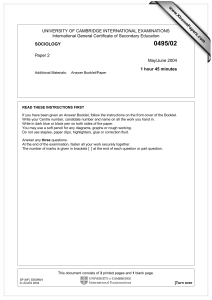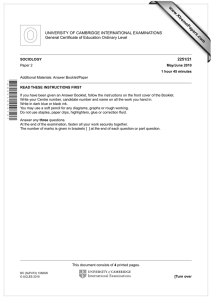www.XtremePapers.com UNIVERSITY OF CAMBRIDGE INTERNATIONAL EXAMINATIONS General Certificate of Education Ordinary Level 2251/02
advertisement
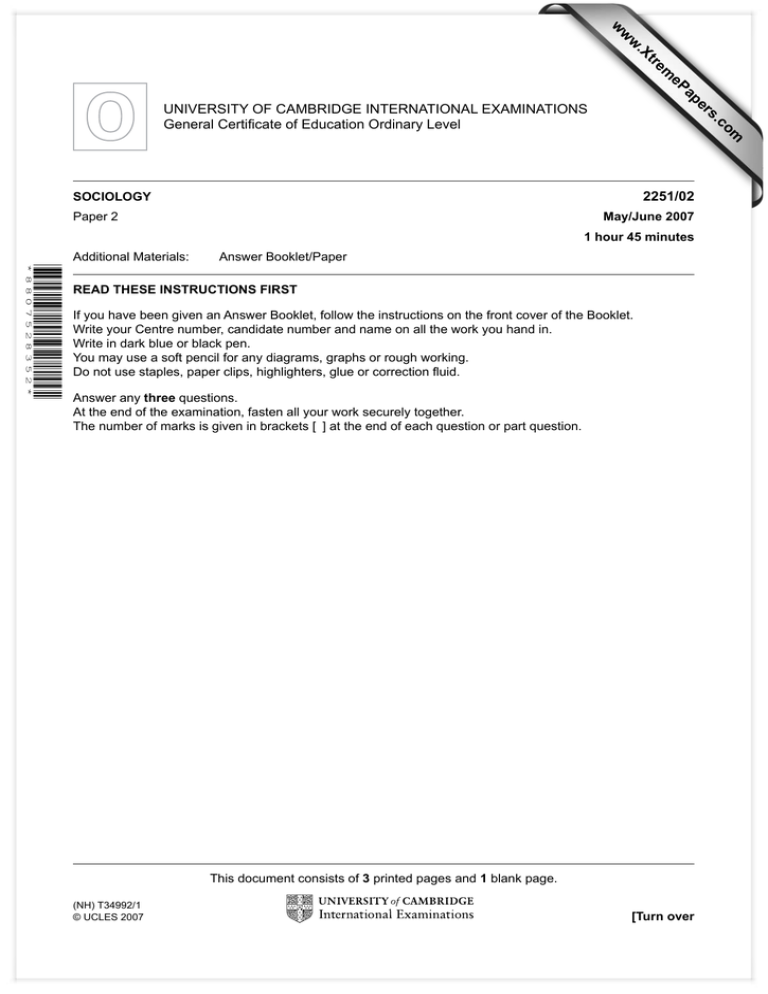
w w ap eP m e tr .X w om .c s er UNIVERSITY OF CAMBRIDGE INTERNATIONAL EXAMINATIONS General Certificate of Education Ordinary Level 2251/02 SOCIOLOGY Paper 2 May/June 2007 Additional Materials: 1 hour 45 minutes Answer Booklet/Paper *8807528352* READ THESE INSTRUCTIONS FIRST If you have been given an Answer Booklet, follow the instructions on the front cover of the Booklet. Write your Centre number, candidate number and name on all the work you hand in. Write in dark blue or black pen. You may use a soft pencil for any diagrams, graphs or rough working. Do not use staples, paper clips, highlighters, glue or correction fluid. Answer any three questions. At the end of the examination, fasten all your work securely together. The number of marks is given in brackets [ ] at the end of each question or part question. This document consists of 3 printed pages and 1 blank page. (NH) T34992/1 © UCLES 2007 [Turn over Section A: Family 1 The roles that men and women perform within the family have changed in modern industrial societies. (a) What is meant by the term roles? (b) Describe two examples of how the roles that men and women perform within the family have [4] changed. (c) In what ways may the roles of boys and girls within the family differ? (d) How far is there equality in the roles performed by men and women in the family today? [8] 2 The divorce rate has risen in most modern industrial societies over the last fifty years. However, divorce is only one form of marital breakdown. (a) What is meant by the term divorce? [2] (b) Describe two other forms of marital breakdown apart from divorce. [4] (c) Explain why the divorce rate has risen in most modern industrial societies over the last fifty [6] years. (d) To what extent is the institution of marriage in decline in modern industrial societies? [2] [6] [8] Section B: Education 3 Although gender stereotyping still exists to some extent in schools, girls are now outperforming boys in many subjects. (a) What is meant by the term gender stereotyping? [2] (b) Describe two reasons why girls are now outperforming boys in some subjects. [4] (c) Explain why subject choice is still often influenced by gender. [6] (d) To what extent are boys and girls treated differently within the education system? [8] 4 Schools prepare young people for the world of work in modern industrial societies. Informal education fulfils a similar function in traditional societies. (a) What is meant by the term informal education? [2] (b) Describe two other functions of schools apart from preparing young people for work. [4] (c) Explain how schools prepare young people for the world of work in modern industrial societies. [6] (d) To what extent do the rich and powerful benefit more than other groups from the education system? [8] © UCLES 2007 2251/02/M/J/07 Section C: Crime and Deviance 5 Labelling theory suggests that some groups in society are more likely than others to be seen as deviant. (a) What is meant by the term deviant? (b) Describe two groups in society who are likely to have the power to label others as deviant.[4] (c) Explain how traditional societies use informal social controls to deter deviant behaviour. [6] (d) How useful is labelling theory in understanding deviance? [8] 6 Official statistics provide an inaccurate measure of the true extent of crime in society. (a) What is meant by the term official crime statistics? (b) Describe two reasons why not all crimes that are committed in a society are recorded in the [4] official crime statistics. (c) Explain why some groups are more likely than others to be represented in the crime statistics. [6] (d) To what extent can criminal behaviour be explained in terms of social inequality? [2] [2] [8] Section D: Culture, Communication and the Mass Media 7 Ownership of the mass media has become increasingly concentrated in the hands of a few powerful individuals and groups in modern industrial societies. (a) What is meant by the term mass media? (b) Describe two ways in which ownership of the mass media may be a source of power in [4] modern industrial societies. (c) Explain why it may be bad for society that ownership of the mass media is increasingly concentrated in the hands of a few powerful individuals and groups. [6] (d) To what extent are the owners of the mass media able to control what is published and broadcast? [8] 8 Journalists filter and select the news they report and this sometimes leads to accusations of bias and distortion. (a) What is meant by the term bias? [2] (b) Describe two examples of how selective reporting may lead to bias. [4] (c) Explain the factors that influence journalists in their selection and presentation of news reports. [6] (d) To what extent does the mass media influence political attitudes and behaviour? © UCLES 2007 2251/02/M/J/07 [2] [8] BLANK PAGE Permission to reproduce items where third-party owned material protected by copyright is included has been sought and cleared where possible. Every reasonable effort has been made by the publisher (UCLES) to trace copyright holders, but if any items requiring clearance have unwittingly been included, the publisher will be pleased to make amends at the earliest possible opportunity. University of Cambridge International Examinations is part of the Cambridge Assessment Group. Cambridge Assessment is the brand name of University of Cambridge Local Examinations Syndicate (UCLES), which is itself a department of the University of Cambridge. 2251/02/M/J/07
